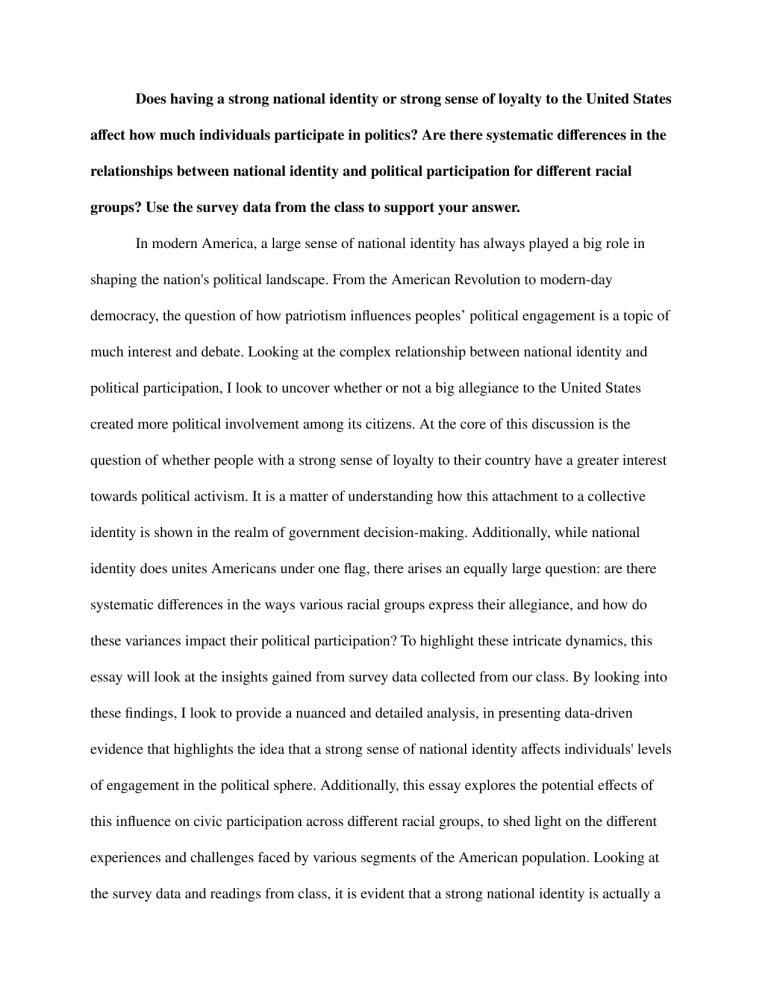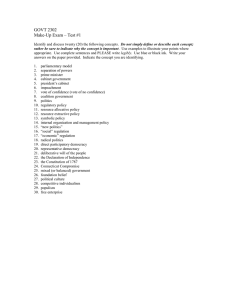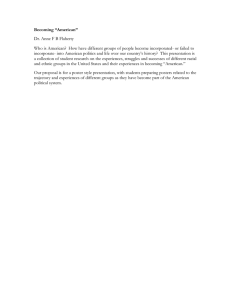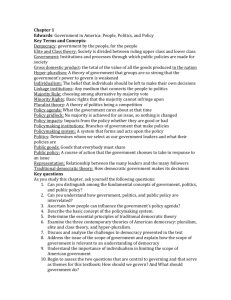
Does having a strong national identity or strong sense of loyalty to the United States affect how much individuals participate in politics? Are there systematic differences in the relationships between national identity and political participation for different racial groups? Use the survey data from the class to support your answer. In modern America, a large sense of national identity has always played a big role in shaping the nation's political landscape. From the American Revolution to modern-day democracy, the question of how patriotism influences peoples’ political engagement is a topic of much interest and debate. Looking at the complex relationship between national identity and political participation, I look to uncover whether or not a big allegiance to the United States created more political involvement among its citizens. At the core of this discussion is the question of whether people with a strong sense of loyalty to their country have a greater interest towards political activism. It is a matter of understanding how this attachment to a collective identity is shown in the realm of government decision-making. Additionally, while national identity does unites Americans under one flag, there arises an equally large question: are there systematic differences in the ways various racial groups express their allegiance, and how do these variances impact their political participation? To highlight these intricate dynamics, this essay will look at the insights gained from survey data collected from our class. By looking into these findings, I look to provide a nuanced and detailed analysis, in presenting data-driven evidence that highlights the idea that a strong sense of national identity affects individuals' levels of engagement in the political sphere. Additionally, this essay explores the potential effects of this influence on civic participation across different racial groups, to shed light on the different experiences and challenges faced by various segments of the American population. Looking at the survey data and readings from class, it is evident that a strong national identity is actually a passive symptom and is not the driving force that can motivate individuals to participate in politics, because a weak national identity can lead people to participate because of the intent to make their resident country a better place for themselves and others. Understanding this link between national identity and political participation gives us an opportunity to comprehend how a shared sense of belonging and a sense of alienation can empower and mobilize citizens, reinforcing the democratic fabric of the United States. In the following sections, we will delve deeper into the survey data and unpack the connection between national identity and political involvement, taking into account historical contexts, modern realities, and the complex relationship between race, ethnicity, and civic engagement. By the end of this essay, I hope to gain a comprehensive understanding of how the power of national identity relates to American politics, which would influence the way that individuals contribute to their nation's democracy. The relationship between national identity and political participation is a complex and complicated phenomenon that has been studied by scholars for decades. At the core of this relationship is the question of how individuals' sense of patriotism and loyalty to their nation can shape their level of engagement in political activities. Many theoretical perspectives show that a lower sense of national identity can actually lead people to become more actively involved in politics. This seemingly counterintuitive idea can be explained by the idea that individuals who do not strongly identify with their nation may feel a greater urgency to participate in politics so that they are able to influence policies and institutions, shaping the country in a way that aligns more closely with their values. In the article The American Muslim voter: Community belonging and political participation the author states that, “Despite the hostile context in which Muslim Americans have found themselves in the post-September 11 era, thousands of Muslims take part in American elections each year” (Ocampo, Dana, Barreto, p. 85). This observation highlights how individuals with stigmatized identities are able to navigate a landscape where their identity is constantly questioned or even undermined. In these cases, a lower sense of patriotism might not necessarily translate to lower political engagement. It can lead to a higher participation rate as a way of showing their national presence, advocating for their rights, and shaping the nation's ideas to better reflect their perspectives. This phenomenon shows that the conventional assumption that there is a higher sense of patriotism reflects a higher political participation rate. By looking at the experiences of marginalized groups like Muslim Americans within the context of political participation,we are able to look at the ways in which different degrees of national identity intersect with the activeness of political engagement. This dynamic is particularly interesting when looking at the survey data, because it provides a basis to look at whether people who think of themselves as less patriotic are indeed more inclined to take part in political activities, which offers fresh insights into this complex relationship. Research in political science, psychology, and sociology has also demonstrated the importance of group identity as a factor in influencing individual political behavior. In one journal, the researcher states that, “Research in political science, psychology, and sociology has also demonstrated the importance of group identity as a factor influencing individual political behavior” (Leighley, Venlitx, p. 1096) This concept shows the idea that individuals' affiliations with many groups can significantly shape their political inclinations and actions. Group identity is a lens through which many people see their roles in society and how they relate to the political landscape. People's identification with their specific groups can lead to shared values, beliefs, and objectives that drive collective political engagement. This influence of group identity on political behavior highlights the intricate connections between personal identities, social dynamics, and the larger political context. As individuals engage with the political landscape, factors such as national identity to socioeconomic status come into play, as they change their level of involvement and commitment. Within this context, the quote, "socioeconomic status variables such as education exhibit a clear effect only insofar as they socialize one to a greater sense of civic duty, greater efficacy in voting, and tighter adherence to democratic ideals" (Cho, p. 1145) shows the intricate role of socioeconomic factors in creating political engagement. While conventional knowledge often associates higher education and socioeconomic status with increased political participation, this quote shows that the impact is seen through civic values and democratic principles. Education, which is a key component of socioeconomic status, goes beyond more than just having knowledge, it serves as a way of looking at the responsibilities of citizenship, which increases people’s confidence in their ability to participate effectively, and creates a strong commitment to democracy. This insight with the understanding that education and empowerment play important roles in motivating people to become active participants in the political process. The relationship between how much people feel connected to their country, how active they are in politics, and how much money and education they have is really interesting to study. It's not always what you might expect because sometimes, people who don't feel connected to their country actually get more involved in politics. This is true for groups that are often treated unfairly or looked down upon. Belonging to a certain group also makes a big difference because it can shape how people think and act politically. And when it comes to education and how much money someone has, it's not just about knowing things – it's about feeling like it's your duty to be a good citizen, having confidence in voting, and caring a lot about democracy. All of these factors come together to show that getting involved in politics is really complex. When we look at all these different aspects, we can better understand why people take part in democracy, which helps us all be more empowered and have better discussions about how our society works. In the world of American democracy, the relationship between national identity, political participation, and racial diversity is a complex topic that needs a detailed exploration. The complex interplay between these variables can provide amazing insights into the ideas that drive people’s involvement in politics. Examining the survey data collected from a diverse class, we are able to dive into the extent to which a strong national identity or loyalty to the United States affects individuals' political engagement. Additionally, it explores whether there are systematic variations in the dynamics between national identity and political participation across different racial groups. The analysis, drawn from the provided data, reveals a pattern, which is a positive relationship that exists between a weaker sense of national identity and increased political engagement, especially among racial groups that have been historically marginalized and seek greater representation within American society. The survey data shows a compelling trend that people with a less pronounced sense of national identity or loyalty to the United States are more inclined to participate actively in political activities. This observation challenges conventional assumptions that strong national identity would correlate with heightened political engagement. The data reveals that respondents who perceive traditional markers of American identity, such as being born in America, having American citizenship, and living in America for most of their life, as less important show a greater pull toward political involvement. These individuals seem to be driven by a desire to assert their voice, shape the political landscape, and make an impact on the policies that affect them. Moreover, an interesting pattern comes when considering the intersection of national identity, racial diversity, and political participation. Among various racial groups, Asian Americans, Hispanics or Latinos, and Black Americans exhibit a stronger positive relationship between a weaker sense of national identity and elevated political engagement. This pattern is particularly pronounced in contexts where these groups have faced historical marginalization or systemic inequalities. For instance, Asian Americans, who have often grappled with being considered perpetual outsiders despite their contributions, demonstrated higher levels of political engagement when their sense of national identity was less important. This suggests that a lack of strong attachment to a single national identity encourages these groups to actively seek inclusion and advocate for their rights within the political space. Similarly, Hispanic or Latino respondents, who are often faced with debates about immigration and belonging, showed heightened political involvement when their identification with traditional American identity was less pronounced. This finding makes sense within the notion that individuals who feel marginalized or have complex relationships with the national narrative are motivated to engage in politics to challenge stereotypes, influence policy decisions, and assert their presence within the American social system. The relationship between national identity and political engagement also holds interesting implications for Black Americans, who have historically been subjected to systemic racism. The data shows that as the emphasis on traditional American identity weakens, Black Americans' political participation tends to increase. This pattern could be seen as a response to historical marginalization and a desire to use political engagement as a means of advocating for social justice, equal representation, and policy reforms that address systemic inequalities. Furthermore, the survey data shows the crucial role that national identity plays in shaping political behavior. However, the findings suggest that a stronger national identity is not necessarily conducive to greater political engagement. Instead, individuals who may not strongly identify with mainstream American identity markers are more likely to engage in political activities. This counters the conventional narrative that more nationalism leads to more active political participation. The survey data from the class provides compelling evidence of a positive relationship between a weaker national identity and higher levels of political engagement. This relationship is particularly there among racial groups that have historically faced marginalization or have wanted more representation within the American political world. As Asian Americans, Hispanics or Latinos, and Black Americans demonstrate, the lack of strong identification with mainstream American identity characteristics can lead to increased political participation as a means of addressing historical inequalities and advocating for their rights. These findings challenge traditional assumptions about the link between national identity and political engagement, while about bringing light on the complex relationship of factors that drive individual's' involvement in the American democratic process. In conclusion, in the intricate society of modern American democracy, the relationship between national identity, political engagement, and the dynamics of diversity is a captivating topic. This exploration looks at a very complex relationship that challenges traditional assumptions and dives into the multifaceted nature of individual participation in politics. The influence of a strong national identity on an individual's level of political involvement is still a subject of profound interest and ongoing discourse. Throughout this essay, I wanted to uncover whether patriotism to the United States correlates with heightened political engagement among its citizens. Through the readings and survey data, I witnessed how national identity, despite its nature, does not immediately lead to increased political engagement. Contrary to conventional beliefs, a lower sense of national identity can serve as a catalyst for higher political involvement, particularly among marginalized groups navigating a society where they are under scrutiny. The phenomenon is best captured by the observations regarding the active participation of Muslim Americans in elections, despite the challenges posed by societal perceptions. In these cases, a weaker attachment to mainstream national identity markers becomes a driving force for active political engagement, motivated by the wish to show presence and advocate for rights. Moreover, this exploration looked at the subjects of political science, psychology, and sociology, showing the intricate connections between group identity and political behavior. This highlighted how affiliations with various groups intricately mold political inclinations and actions, highlighting the powerful role of collective identity in shaping the political landscape. This dynamic is a testament to the relationship between personal identities, societal dynamics, and the overarching political scene. Education and socioeconomic status, as revealed through the quote emphasizing their impact on civic duty, efficacy in voting, and adherence to democratic ideals, are also important factors in increasing political engagement. The influence of education shows that increasing knowledge, creating a sense of civic responsibility and commitment to democratic values. This reinforces the idea that political engagement is not merely a product of national identity but also a creation of informed citizenship because of education and empowerment. The relationship between national identity, political engagement, and diversity is an interesting area that offers a new lens to see individual participation in politics. As the essay looked through historical contexts, modern realities, and racial dynamics, it highlighted the complex nature of political involvement. The relationship between these factors shows that while national identity plays a role, it is not the sole factor of political engagement. Instead, the desire for change, representation, and justice brings individuals from various backgrounds into the political arena. The intricate relationship between national identity, political engagement, and diversity reveals a nuanced idea that highlights the democratic framework of the United States, making sure that the voices of all citizens contribute to American democracy. Works Cited: Cho, Wendy. “Naturalization, Socialization, Participation: Immigrants and (Non-)Voting.” The Journal of Politics, vol. 61, no. 4, Nov. 1999, pp. 1140–1155, https://doi.org/10.2307/2647557. Accessed 10 Feb. 2020. Ocampo, Angela X., et al. “The American Muslim Voter: Community Belonging and Political Participation.” Social Science Research, vol. 72, May 2018, pp. 84–99, www.sciencedirect.com/science/article/pii/S0049089X17302521, https://doi.org/10.1016/j.ssresearch.2018.02.002. Accessed 5 Nov. 2019. Leighley, Jan E., and Arnold Vedlitz. “Race, Ethnicity, and Political Participation: Competing Models and Contrasting Explanations.” The Journal of Politics, vol. 61, no. 4, Nov. 1999, pp. 1092–1114, https://doi.org/10.2307/2647555. Accessed 14 Sept. 2019.





